Is Watermelon Healthy for You?
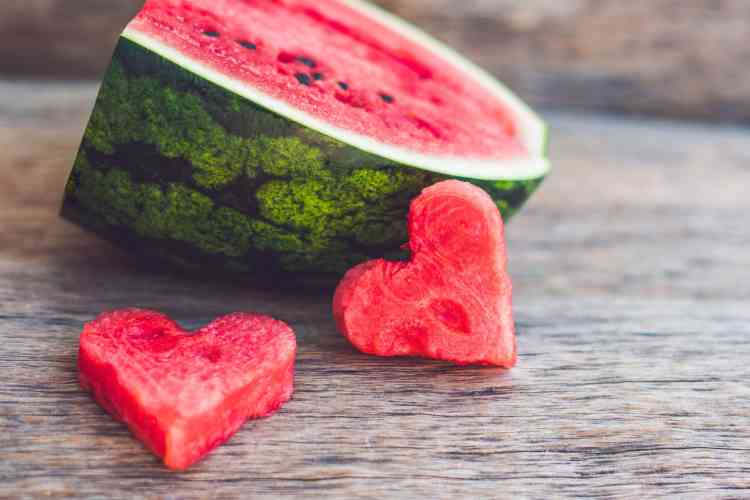
You’ve seen it touted as a weight-loss superfood, but is watermelon healthy for you? It seems like a no-brainer: composed mostly of water, watermelon’s nutrition profile is at the very least free of fat, sodium and many of the things dieters try to avoid.
But just how good for you is watermelon? Is it worth the hype, or would you be better off seeking healthy snacks elsewhere? Let’s dive into the facts about watermelon to answer, once and for all: “Is watermelon healthy for you?” And if so, how healthy is watermelon compared to other favorite weight-loss foods?
Jump to Section
- Is Watermelon Good for You?
- How Healthy Is Watermelon for You?
- What Are the Health Benefits of Watermelon?
Is Watermelon Good for You?
If watermelon is a key component of your diet, fear not: we’re not here to burst your bubble. The answer to the question: “Is watermelon good for you?” is definitely “yes.” But just how healthy is watermelon, exactly?
Hydration
One of the most commonly cited watermelon benefits is hydration: it is called watermelon, after all. And it’s impossible to overemphasize the critical importance of getting enough water for your health.
That alone is enough to make watermelon one of the healthiest fruits you can eat, especially during hot seasons when you lose lots of fluids or if you regularly do intense exercise.
Lycopene and Beta-Carotene
However, that’s not the only health benefit watermelon offers. Another reason watermelon is healthy for you is its high concentration of lycopene, an antioxidant compound that offers a whole host of health benefits.
Eating foods rich in lycopene reduces the risk of inflammation-related ailments like heart disease and maybe even cancer. It can also protect your cells from damage. So not only is watermelon healthy because it’ll keep you hydrated, but it gives your immune system a boost, too.
Yellow watermelon is also a great variety to go for if you can get your hands on it because it is rich in beta-carotene, which means it’s especially good for protecting your vision. But while the nutritional profile is a bit different with this variety, fret not: watermelon is healthy for you in any color.
Vitamin Content
Another watermelon nutrition perk is its richness in key vitamins like A, B6 and C. All of those vitamins are great for protecting and nourishing your skin, and lycopene can prevent sunburn, meaning watermelon is healthy for you if you’re concerned about protecting and caring for your skin. And you can’t forget that proper hydration is vital for skin health, too — another reason why its high water content makes watermelon healthy for you.
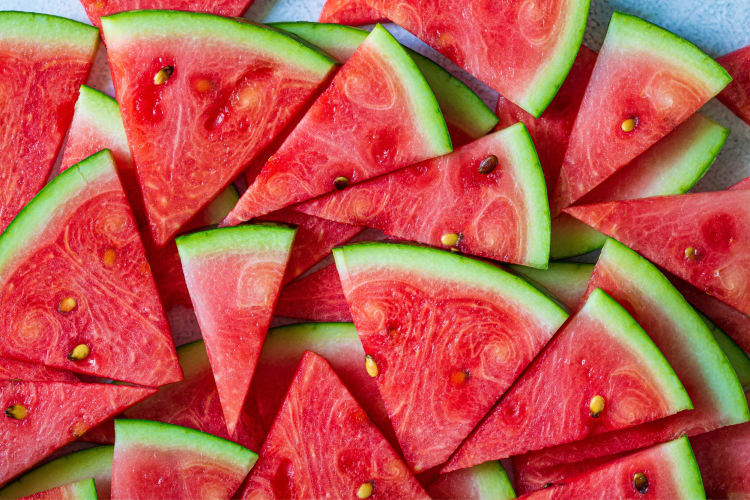
Potential Drawbacks of Watermelon
However, while watermelon is healthy for you in most ways, there are some groups of people who should exercise caution when incorporating it into their diets. That’s because, while it’s healthy for you due to being high in nutrients and low in calories, watermelon is also quite high in sugar.
That can be great if you’ve just finished running a half-marathon at the height of summer, but if you have diabetes or any other condition that makes your body sensitive to changes in blood sugar, watermelon might cause it to spike.
Do note that watermelon is lower in sugar than a lot of fruits, so while it should be consumed in moderation if excess natural sugar content is of concern, it’s still one of the best fruits to go for in terms of being a low-sugar option.
It’s also best for everyone, regardless of health, to be cautious about eating too much sugar, even naturally occurring sugars. While this doesn’t make watermelon less healthy for you, it does mean that you should watch your portion sizes carefully.

Is Watermelon Healthy for Weight Loss?
You might have met a dieter who swears by huge portions of watermelon as a way to fill your stomach for very few calories. In fact, such practices might have been what first led you to ask: “Is watermelon good for you?” The practice even has a name: The Watermelon Diet. But does it hold water? Is watermelon good for you if you want to lose weight?
Yes, but don’t run too far with that idea — a diet consisting entirely of one food is almost never an advisable way to lose weight. It’s no secret that watermelon is very low in fat, calories and sodium, which makes it appealing to people who’d like to lose weight.
Additionally, its high water content is great for digestion and also means that watermelon will make you feel full, which can prevent cravings for other, higher-calorie foods. Plus, weight loss programs usually involve exercise, so watermelon will help you recoup whatever fluid you lose when you sweat it out at the gym.
Eating watermelon as a healthy snack while trying to lose weight can be a great choice because you’ll feel full, get some key nutrients in, hydrate yourself and avoid feeling hungry. But it’s a bit of a stretch to claim that a diet of only watermelon is healthy for you.

Is Watermelon Juice Healthy?
Is watermelon healthy for you in all forms, or only whole? You might be wondering about watermelon juice and its health benefits. So is watermelon juice healthy for you? It certainly can be.
We’ve talked a lot about hydration, and watermelon juice is great for that. Why? Not only because of its high water content but also because it contains potassium and magnesium, two minerals that are vitally important for maintaining electrolyte balance. It can also aid in muscle recovery, as it contains an amino acid called citrulline that’s involved in the process of rebuilding damaged muscles after intense exertion.
However, much like raw watermelon, watermelon juice is high in sugar. Like any type of fruit juice, you will want to be cautious about portions to prevent blood sugar spikes and other health problems associated with eating too much sugar.
Additionally, not all commercial fruit juices are created equal, and many brands of watermelon juice have additives and additional ingredients that make them much less healthy than 100% natural watermelon juice. When in doubt, eating whole fruit is always better than drinking it juiced.
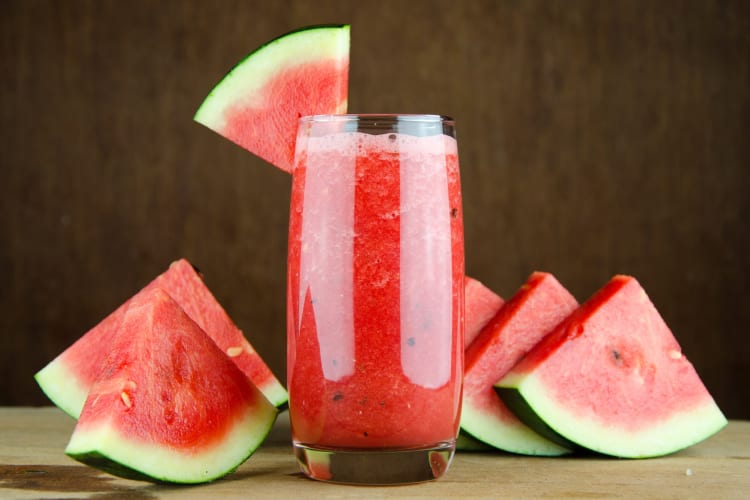
How Healthy Is Watermelon for You?
Okay, we now know watermelon is healthy for you. But why? Let’s break down the nutritional profile of the average serving of watermelon to see.
In one 280-gram serving, you’ll get on average:
- 85 calories
- 0.4 grams of fat
- 3 milligrams of sodium
- 314 milligrams of potassium
- 21 grams of carbohydrates
- 1.1 grams of dietary fiber
- 17 grams of sugar
- 37% DV vitamin C
- 7% DV magnesium
- 5% DV vitamin B6
As you can see, this fruit is low in calories which makes watermelon healthy for you as a snack, especially if you are trying to lose weight. It’s also low in fat and high in many important vitamins and minerals, especially vitamin C which can help with things like iron absorption, immune system support and skin health.
The one potential drawback, as covered above, is that the fruit is quite high in sugar. So, while it may be tempting to eat a lot due to its low amounts of calories and fat, it’s important to consume watermelon in moderation to avoid adding an excess of sugar to your diet and potentially negating the health benefits of watermelon.
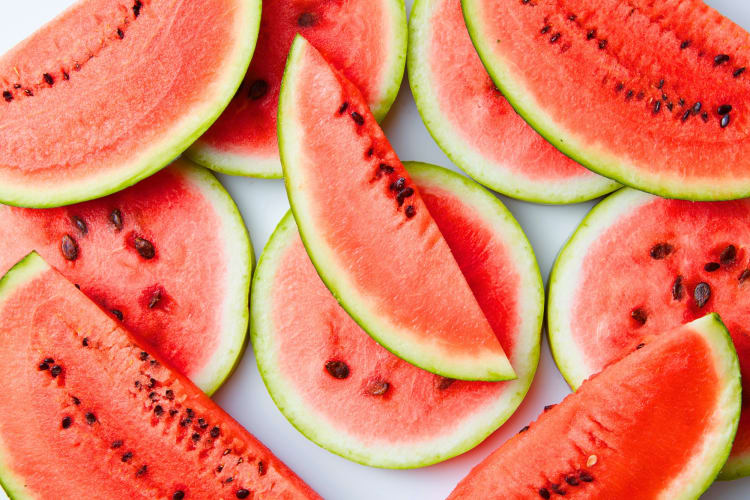
What Are the Health Benefits of Watermelon?
By now, you’re pretty much an expert in what makes watermelon good for you, but it’s always useful to recap exactly how eating watermelon can help your health. Some of the best health benefits of watermelon include reducing inflammation, protecting your skin from damage, hydrating you and leaving you feeling satiated without consuming too many calories.
You’ll also replenish your levels of valuable electrolytes when you eat watermelon, and thanks to its delicious taste, watermelon is one of the best healthy snacks for kids and adults alike. But what, specifically, will watermelon do for you? Here are a few examples.

Immunity Boost and Reduced Risk of Disease
Watermelon is loosely linked to a decreased risk of several diseases. This is mostly thanks to lycopene, which prevents inflammation. Here are a few of the health scares you’re likelier to avoid if you eat watermelon regularly:
- Heart Disease: As reported by Medical News Today and multiple studies, watermelon is beneficial to heart health. This is due to the high amounts of lycopene found in watermelon which curbs inflammation. Several other compounds in watermelon are also linked to healthy artery function.
- Cancer: Not only is cancer linked to chronic inflammation, but it’s also worsened by free radicals — cell-destroying compounds that enter the body through sun damage or external toxins. Antioxidants can fight both inflammation and damage from free radicals, which has led some scientists to link watermelon to a decreased risk of cancer.
- Skin Damage: Free radicals damage your skin, too, so watermelon helps to keep your skin healthy. Hydration is also critical for healthy skin, and watermelon is composed of about 90% water.
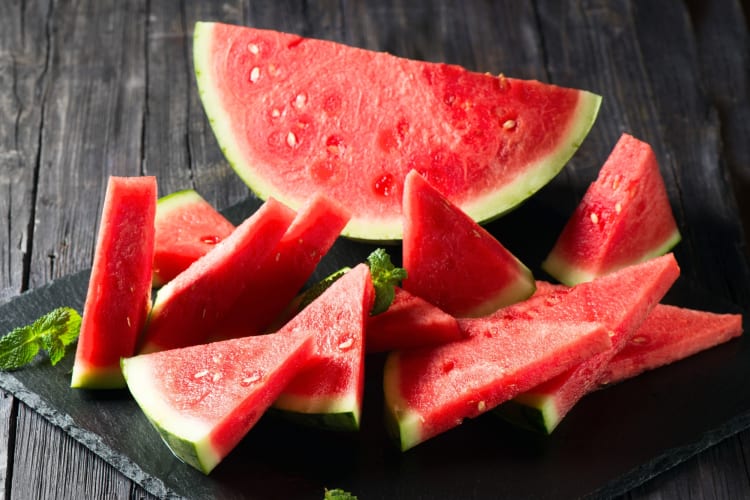
Workout Recovery
If you enjoy activities like pilates, running, playing team sports or weightlifting, your body is probably used to regular, strenuous activity — and that means you need to pay special attention to nutrition for recovery purposes. And that doesn’t just mean a protein shake: watermelon is beneficial as well!
If strenuous exercise is a regular part of your life, watermelon is healthy for you not only because it’ll keep you hydrated, but also because it aids in electrolyte balance. It even contains compounds that can repair sore or damaged muscles.
Plus, it’s an all-natural alternative to the additive-filled foods that are often marketed at athletes and fitness enthusiasts for the same purposes (even though it may not offer exactly the same benefits or nutritional profile as these items).

Maintaining a Healthy Weight
We’ve already established that eating nothing but watermelon isn’t a great dieting idea, but even so, watermelon is healthy for you as an addition to a weight loss-oriented diet. It’s filling, hydrating and a reliable snack for days when your stomach feels like a bottomless pit.
Moreover, some diets designed for weight loss exclude important nutrients and don’t actually lead to overall improved health, so incorporating watermelon into your diet will help keep your levels of important vitamins and minerals up.

Hydration
There’s been a silly but true saying going around in the fitness community lately: “hydrate or die-drate.” While the results of poor hydration are rarely that dramatic, it’s true that it’s hard to overstate how important it is to drink enough water.
And if drinking enough water on its own is a challenge for you, you’ll get a lot of that hydration by eating watermelon. It’s right there in the name and one of the biggest reasons watermelon is healthy for you.

There are almost endless reasons that watermelon is healthy for you, and few downsides. Whether your goal is weight loss, healthy skin or feeling refreshed after a workout without all the additives of a sports drink or protein bar, you’ll find that watermelon offers great benefits. So it isn’t entirely surprising that it’s been hailed as the ultimate diet food.
However, it’s important to remember that you can easily have too much of a good thing. While watermelon is healthy for you and deserves every bit of its reputation for nutritional benefits, it’s still important to moderate your intake and consider things like its high sugar content.
Not to mention, it’s nearly always unwise to rely too heavily on a single food. So you may hear of fad diets and wonder: “Is watermelon that healthy for you?” and it’s a valid question. But it doesn’t change the facts: the quintessential summer cookout fruit deserves a place in any healthy balanced diet.
For even more ways to explore your favorite foods, check out other experiences happening on Cozymeal.



FOOD FOR THOUGHT?
Join the conversation.